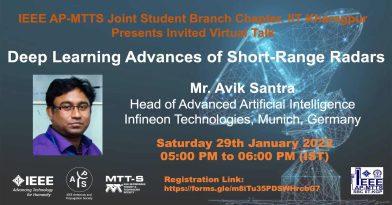
-
Saturday, January 29, 2022 5:00 pm - 6:00 pm(New Delhi Time) Add to my calendar
Deep Learning Advances of Short-Range Radars
Mr. Avik Santra
Infineon Technologies, Munich, Germany
Abstract: Radar has evolved from a complex, high-end aerospace technology into a relatively simple, low end solution penetrating industrial, automotive and consumer market segments. The adoption of short-range radars for several industrial, consumer and in-cabin automotive applications require reliable system performance at small form factor, low-power and low-cost. The advancement of silicon and packaging technology has led to small form factor such that they can be mounted on devices, aesthetically concealed without affecting the system performance. Furthermore, the push of computing power has propelled the use of advanced signal processing and deep learning algorithms that is facilitating to parse meaningful information from radar signals. Radar sensing has enabled several interactive human-machine interface such as human sensing and tracking for presence, occupancy, counting. Radars can provide ubiquitous sensing technology that can facilitate energy savings by controlling lighting, heating, ventilation and air-conditioning. Traditional radar signal processing involves 2D FFT to transform the raw ADC data into range-Doppler image, followed by moving target indicators to remove static targets on range-Doppler images (RDI), minimum variance distortionless response beamformer to transform RDI across channels into range-angle images. This is followed by a constant false alarm rate detector and clustering algorithm to localize the human target. However, indoor human detection suffers from ghost targets and multi-path reflections from other static objects. In this talk, we outline how the traditional radar signal processing is being replaced or augmented with deep learning algorithms to enable better performance with simpler mathematical operations.
Speaker’s Bio: Avik Santra (Senior Member, IEEE) received the M.S. (Hons.) degree in signal processing from the Indian Institute of Science, Bengaluru, in 2010. He is currently leading research and development of signal processing and deep learning algorithm/solutions of radar and depth sensors for human–machine interface applications with Infineon, Neubiberg. Earlier in his career, he has worked as a System Engineer for LTE/4G modem with Broadcom Communications, and also has worked as a Research Engineer developing cognitive radars with Airbus. He is the author of the book titled Deep Learning Applications of Short-Range Radars published by ArTech House. He has filed over 50 patents and published more than 35 research articles related to various topics of radar waveform design, radar signal processing and radar machine/deep learning topics. He was a recipient of several outstanding reviewer awards. He is a reviewer at various IEEE and Elsevier journals.
This event is organised by IEEE AP-MTTs SBC IIT Kharagpur.